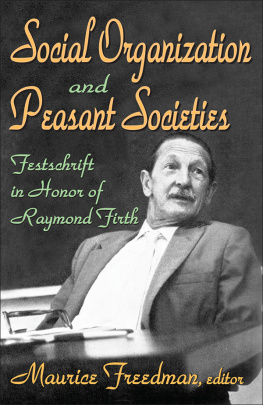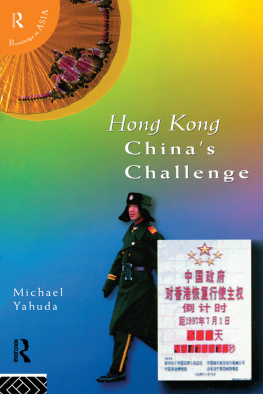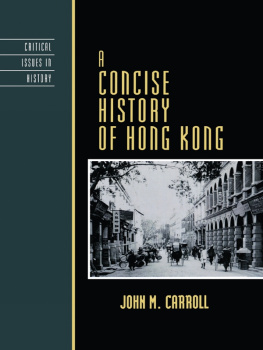First published 2004 by Berg Publishers
Published 2020 by Routledge
2 Park Square, Milton Park, Abingdon, Oxon OX14 4RN
605 Third Avenue, New York, NY 10017
Routledge is an imprint of the Taylor & Francis Group, an informa business
Maurice Freedman 2004
All rights reserved. No part of this book may be reprinted or reproduced or utilised in any form or by any electronic, mechanical, or other means, now known or hereafter invented, including photocopying and recording, or in any information storage or retrieval system, without permission in writing from the publishers.
Notice:
Product or corporate names may be trademarks or registered trademarks, and are used only for identification and explanation without intent to infringe.
ISBN 13: 978-1-8597-3869-6 (hbk)
ISBN 13: 978-1-8478-8194-6 (pbk)
PREFACE
I published Lineage Organization in Southeastern China in 1958. It was an attempt to bring together what I then knew about its subject, mainly from published work, and to discuss the role of unilineal descent grouping in China against the background of anthropological theory. When I finished it I knew it was not ended, for I was conscious of having failed to tap the existing sources in Chinese and Japanese, and I was confident that my exercise in the armchair anthropology of China would fairly soon be improved on both by people sinologically better equipped than I and by field workers able to take advantage of the possibilities for research open in the New Territories of Hong Kong.
My confidence, especially in respect of the field work, was well placed; several anthropological studies have been made in the New Territories in the last five years or so (my own very brief one among them); and I have decided to continue the argument begun in Lineage Organization. But this new book is no more conclusive than its predecessor. It is able to call on more facts and I can write about them with greater assurance now that I have myself explored the New Territories and established from the evidence of my own eyes what, in timorous moments, I had earlier feared might be the product of a too enthusiastic imagination. Yet this second instalment is by no means the end of the story. The great bulk of the field work in the New Territories is still unpublished. The same is true of the field research in Taiwan which has an important bearing on the provinces of Fukien and Kwangtung. And we are merely at the beginning of the period during which the written genealogies and gazetteers (fang-chih) laid up by Chinese society and the documents produced by Japanese administrators and scholars in Taiwan will be fully exploited. A third instalment will be necessary in a few years' time, although it is very unlikely that I shall be its author.
London School of Economics Monographs on Social Anthropology, no. 18 (reprinted with typographical corrections, London and N.Y., 1965).
It will be clear that I have not been able to remedy in this book all the defects of the first, but since 1957, when Lineage Organization went to the printer, my view of Chinese social organization has been enlarged by several experiences. First, I have read in the new Western work on the sociology and social history of China. In recent years this literature has greatly increased, and, coming mainly from the United States, it places us deeper in debt to American scholarship. Second, during the years 1962 to 1964 I was lucky enough to take part in a series of seminars on the sociology and anthropology of China organized by the cumbersomely named but very agreeably conducted ' Sub-committee on Chinese Society of the Joint Committee on Contemporary China of the American Council of Learned Societies and the Social Science Research Council'. In these seminars, as well as in other, less formal, settings, I was privileged to have access to the learning and experience of specialists whom, along with the people responsible for organizing the seminars (especially Mr Bryce Wood of the Social Science Research Council, New York), I should like very warmly to thank. Third, I have done more reading in the older literature on China and re-read much of it, finding (the pleasure must surely be common) that it comes alive all over again as new questions are put to it. Finally, I was given the opportunity in 1963 to make a short field trip to the New Territories; it tied my earlier speculations to a living reality and gave me the chance to look more deeply into the documented past of the Kwangtung county of Hsin-an from which the New Territories were created in 1898.
This book draws on the newer literature, on older writings which I had not previously used, and on my field work in 1963. I have resisted the temptation to set out the results of this field research in great detail because they will be better presented independently of a work intended to be about southeastern China in general. But I think it will be clear that many of the changes that have taken place in my view of society in Fukien and Kwangtung are attributable to my experience in the New Territories. It is for that reason that I must stress its importance.
A preliminary account of my field research was given in a mimeographed report prepared to be read by officers of the New Territories Administration: A Report on Social Research in the New Territories, Hong Kong, 1963. A sketch of some aspects of New Territories society is given in my paper, 'Shifts of Power in the Hong Kong New Territories', Journal of Asian and African Studies, vol. 1, no. 1, 1966, Leiden.
In February 1963 I began a period of field study in the New Territories. It was cut short after three months by my falling sick, but in that time I had come near completing a general survey of social conditions and research needs. The survey was carried out under the auspices of the then newly created London-Cornell Project for the study of Chinese and South-East Asian societies, an enterprise financed jointly by the Carnegie Corporation of New York and the Nuffield Foundation. My work was in addition financed partly out of a Ford Foundation grant made to the London School of Economics and Political Science, and I was in several ways assisted by the New Territories Administration. I acknowledge all this aid with gratitude and record my appreciation of the help and advice given me in Hong Kong by Mr J. B. Aserappa, District Commissioner New Territories, and his officers and staff, especially Mr G. C. M. Lupton (District Officer Tai Po) and Mr Tsang For Piu; by Mr K. M. A. Barnett; by Mr J. W. Hayes; by Mr C. T. Leung; by Mr K. W. J. Topley; by Dr Marjorie Topley; and by Mr P. K. C. Tsui. In writing these names I acknowledge only some of my debts to the people who made it possible for me to move freely and profitably in the New Territories.









